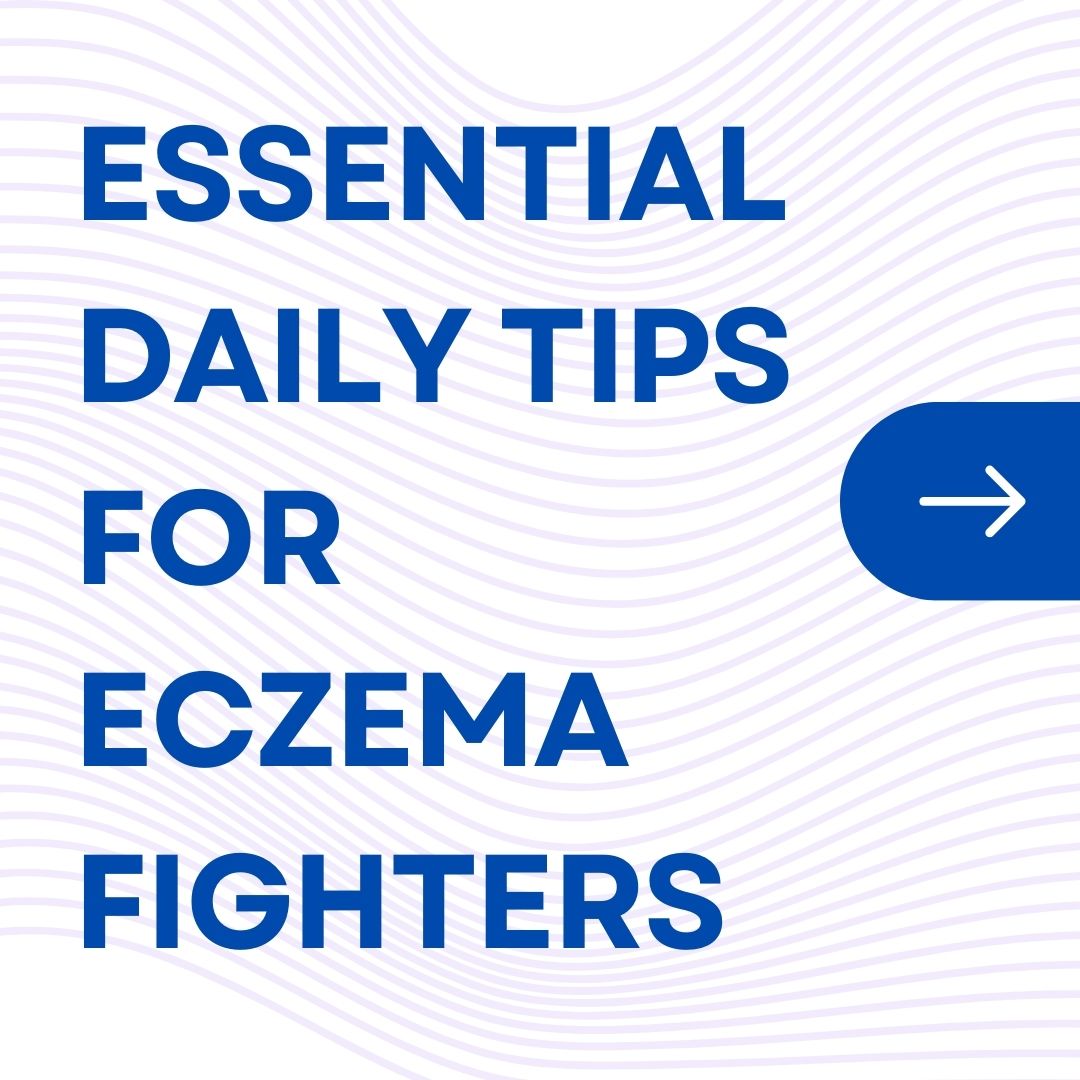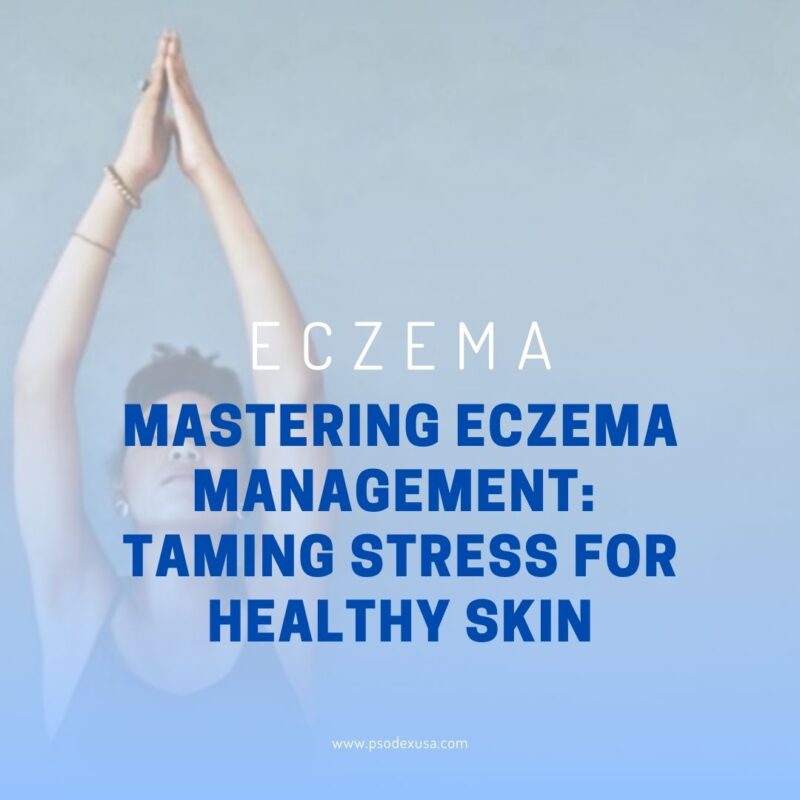Essential Daily Tips for Eczema Fighters

Living with eczema can be challenging, but with the right strategies and daily habits, you can take control of your condition and improve your quality of life. Eczema, also known as atopic dermatitis, is a chronic skin condition characterized by dry, itchy, and inflamed skin. It affects people of all ages and backgrounds, and managing it often requires a multifaceted approach. In this article, we’ll provide you with a set of daily tips for Eczema Fighters to help you better manage your condition and find relief.

Skin Health Starts with Hydration in Eczema
One of the most crucial aspects of managing eczema is maintaining well-hydrated skin. Dry skin tends to exacerbate eczema symptoms, leading to itching, redness, and inflammation. Here are some tips to keep your skin hydrated:
Frequent Moisturizing:
Apply a hypoallergenic, fragrance-free moisturizer to your skin at least twice a day, and more often during flare-ups.
Short, Lukewarm Showers:
Hot water can strip your skin of natural oils. Opt for short, lukewarm showers, and pat your skin dry instead of rubbing.
Choose the Right Moisturizer:
Look for moisturizers with ingredients like ceramides, hyaluronic acid, or shea butter. These help in locking in moisture.

Mastering Eczema Management: Avoiding Triggers for Healthy Skin
Identifying and avoiding triggers is a critical part of managing eczema. Triggers can vary from person to person, but common ones include:
Irritants:
Stay away from harsh soaps, detergents, and cleaning products that can worsen eczema.
Allergens:
If you have allergies, try to limit exposure to allergens like pollen, dust mites, and pet dander.
Sweating:
Excessive sweating can trigger eczema flare-ups. Consider wearing loose, breathable clothing and using a fan or air conditioning to stay cool.

Eczema Comfort: Clothing Choices for Eczema Fighters
The clothes you wear can make a significant difference in managing your eczema. Here are some clothing tips:
Choose Breathable Fabrics:
Natural, breathable fabrics like cotton are usually more eczema-friendly than synthetic materials. Cotton allows your skin to breathe and reduces irritation.
Avoid Tight Clothing:
Tight clothing can rub against your skin and worsen eczema. Opt for loose-fitting, comfortable attire.
Wash New Clothes:
Before wearing new clothes, it’s a good idea to wash them first. This can remove any residual chemicals or dyes that might irritate your skin.

Mastering Eczema Management: Taming Stress for Healthy Skin
Stress is known to trigger or exacerbate eczema symptoms. Managing stress is an important part of eczema management. Here’s how you can do it:
Relaxation Techniques:
Practice relaxation techniques such as deep breathing, meditation, or yoga to reduce stress.
Prioritize Self-Care:
Make time for self-care activities you enjoy, whether it’s reading, painting, or taking a leisurely walk.
Seek Support:
Reach out to support groups or mental health professionals to discuss your feelings and challenges related to eczema.

Eczema Fighters’ Guide: Mastering Skin Care with a Consistent Routine
Creating a consistent daily routine can help you manage your eczema effectively. Here are some tips to establish a routine:
Consistent Bedtime:
Try to go to bed and wake up at the same time every day. A consistent sleep schedule can help your skin repair and regenerate.
Medication Management:
If your doctor has prescribed medication, be sure to take it as directed and follow their recommendations closely.
Daily Skin Care:
Incorporate your moisturizing routine into your daily schedule. Consistency is key to keeping your skin well-hydrated.

Eczema Relief: The Power of Fragrance-Free Choices
Fragrances can often contain chemicals that irritate sensitive skin, making eczema symptoms worse. Here’s how you can avoid fragrances:
Fragrance-Free Products:
Choose fragrance-free soaps, detergents, and personal care products to reduce your exposure to potential irritants.
Check Labels:
Always read product labels to ensure they are free of fragrances. Look for the term “fragrance-free” rather than “unscented.”
Test Products:
Before applying a new product to your skin, consider doing a patch test on a small area to ensure it doesn’t cause a reaction.

Beat the Heat: Staying Cool and Comfortable for Eczema Relief
Excessive heat can make eczema symptoms worse, so staying cool is essential. Here are some tips to stay comfortable:
Air Conditioning:
Use air conditioning or fans to keep your living spaces cool, especially during hot weather.
Light Bedding:
Choose lightweight, breathable bedding to avoid overheating while you sleep.
Cool Compresses:
Apply cool, damp compresses to itchy areas for relief.

Diet and Dermis: Enhancing Eczema Management
While diet may not be a direct cause of eczema, certain foods can trigger or exacerbate symptoms in some individuals. Here’s what you can do:
Keep a Food Diary:
Consider keeping a food diary to track your eczema symptoms and identify any potential food triggers.
Consult a Dietitian:
If you suspect that your diet is affecting your eczema, consult a registered dietitian who can help you make informed dietary choices.
Stay Hydrated:
Drinking plenty of water can help keep your skin hydrated from the inside out.

Navigating Eczema: When to Seek Medical Advice for Effective Relief
If your eczema symptoms persist or worsen despite your efforts, it’s essential to seek professional medical advice. Your healthcare provider can recommend appropriate treatments and solutions tailored to your specific needs.
Living with eczema can be challenging, but by incorporating these daily tips into your routine, you can take control of your condition and lead a more comfortable life. Remember that eczema management is a continuous journey, and what works for one person may not work for another. Be patient, consult with healthcare professionals, and find the strategies that work best for you. With consistent care and a focus on self-compassion, you can thrive as an Eczema Fighter.
Helpful Links:
National Eczema Association (NEA):https://nationaleczema.org/
American Academy of Dermatology (AAD):https://www.aad.org/
Mayo Clinic:https://www.mayoclinic.org/
WebMD: https://www.webmd.com/
eczema.org: https://eczema.org/
Keywords:
Eczema, Atopic Dermatitis, Eczema Treatment, Eczema Symptoms, Eczema Causes, Eczema Management, Eczema Relief, Eczema Cream, Eczema Home Remedies, Eczema Skin Care, Eczema Rash, Eczema Diet, Eczema Causes and Triggers, Eczema Natural Remedies, Eczema Medications, Eczema in Children, Eczema in Adults, Eczema Prevention, Eczema Flare-Ups, Eczema and Allergies, Eczema Itch Relief, Eczema and Stress, Eczema Support Groups, Eczema Cream Reviews, Best Moisturizers for Eczema, Eczema-friendly Clothing, Eczema and Climate, Eczema Care Tips, Eczema and Skin Hydration
Keywords:
types of eczema, type of eczema, dyshidrotic eczema, eczema symptoms, symptoms of eczema, nummular eczema, eczema treatments, eczema causes, eczema causes, what eczema is, Eczema, Atopic Dermatitis, Eczema Treatment, Eczema Symptoms, Eczema Causes, Eczema Management, Eczema Relief, Eczema Cream, Eczema Home Remedies, Eczema Skin Care, Eczema Rash, Eczema Diet, Eczema Causes and Triggers, Eczema Natural Remedies, Eczema Medications, Eczema in Children, Eczema in Adults, Eczema Prevention, Eczema Flare-Ups, Eczema and Allergies, Eczema Itch Relief, Eczema and Stress, Eczema Support Groups, Eczema Cream Reviews, Best Moisturizers for Eczema, Eczema-friendly Clothing, Eczema and Climate, Eczema Care Tips, Eczema and Skin Hydration












